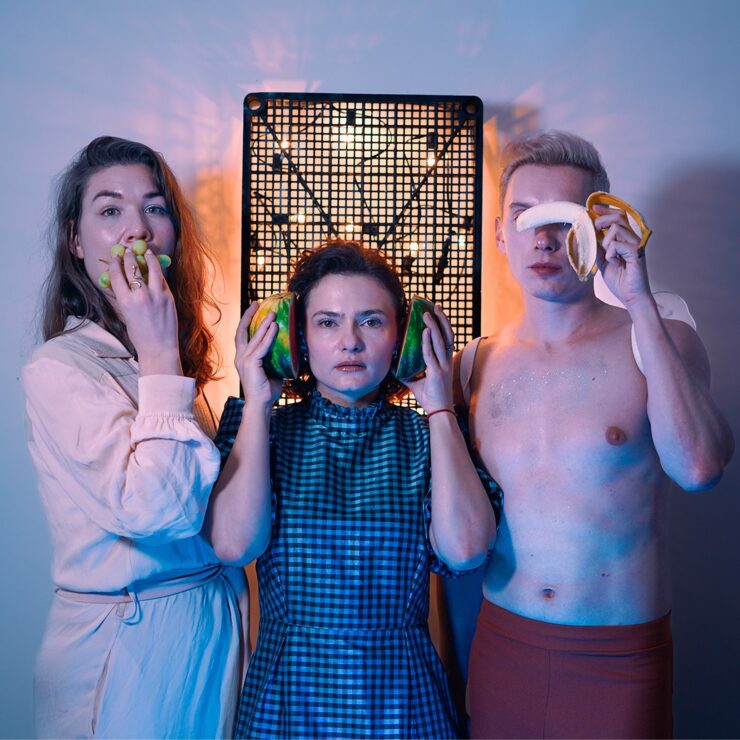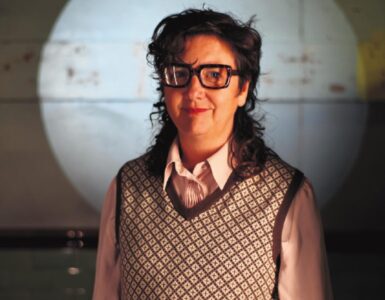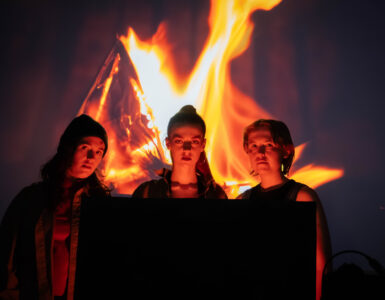Obscure, opqaue and often off-the-wall, Fruits or, The Decline of a Distant Memory is as much a 55 minute and 11 second live art installation as it is a theatrical experience. The show is composed of a series of dramatic vignettes, transposed into the hollow belly of Waterloo station by gorgeous lighting design and visceral soundscapes. Viscerality is at the core of what makes Fruits something special, even if its self-articulation is a little hazy and not quite realised.
It’s safe to say that TAKDAJA’s work sits comfortably in the realm of the abject – that which we eject but still cannot look away from, a dismembered limb floating in a vat of rancid fluid. The performers spit, chew and munch upon decaying fruit in many of the vignettes, their not-quite-perished quality reflecting onto the bodies of those they inhabit. In some sections, we are treated to insights into the lives of those we are watching – the cabaret performer, the cleaner, the gender-bending cucumber peeler – and at others we sit behind a wall of self-imposed obfuscation, asked to endure what we’re seeing at a purely sensual level.
Mimmi Bauer, Pat Dynowska and Michał Szpak dance, skip, and rush up and down the cavernous venue, which feels like it may as well have been built just to house this piece. Their performances sit at varying distances from audience members, inviting us with pin-spot lights to enjoy facial expressions, body parts and unusually placed objects across the room. Despite the distance we feel, there are moments of clear dramatic talent. The bizarre nature of the piece never distracts from the passion and ethos that has clearly gone into telling a story from a unique and obstructive narrative standpoint. What the show is about is really up to you, as TAKDAJA have sort to defy almost every theatrical convention imaginable in their unique, flourishing storytelling style.
This could prove to be a deeply alienating piece for some who want to feel comfortable in the hands of the performers on stage. We are treated to no such luxury. Challenging theatre deserves elevation, and this piece often delivers on that chellenge, yet throughout it feels that we’re never fully convinced of how deeply we’re supposed to be reading into what we see thematically. Some moments flutter by, interspersed by sections where the performers tell us what percentage of the performance we’ve seen and similar meta devices, whereas others take their time to tease out feelings of isolation, queerness, and identity in a world of flux.
Representation of the Polish voice and the Queer voice seems to underlie some elements thematically, and their actualisation is encouraging if a little thin. It isn’t clear as to whether TAKDAJA have much to say about their Polishness or their Queerness, and that works just fine, as we’re treated to imagery and insight that enlightens and enwraps you.
The resulting impact is unclear – as the undulations in depth and breadth offer us little chance to catch the bait that TAKDAJA dangle out in front of us. The piece in this way struggles to fully articulate itself, even from the abstract and sometimes absurd narrative position it willingly puts itself in. The themes and ideas are so broad and interspersed with moments of such depth that we leave feeling a little like we’ve just been edged. I’m not sure if I’m supposed to have left the Cavern feeling anything, and to that end the piece feels as though it dallies in the surface level rather than nourishing us in its subject matter.
Sections are performed across different languages – English, German and Polish most notably – and this is a wonderfully accessible device that opens up the visual strikingness of this piece to broad audiences. We’re not asked to understand the performers all of the time, just to accept what we’re hearing, and I wish the success in translating this audial abstraction had worked as well in delivering the themes of the piece. There is room to tighten up diction and audibility in places, where in the English sections sometimes it was difficult to understand what was being said because of muffling or verbal inarticulation.
To finish on a high – there isn’t enough praise available for the production design of this piece. In complete synthesis with its surroundings, the soundscapes and compositions by Jack Foran hum and dither, creating a textually rich audio world which define the piece tonally with ease. The artifacts that lay around the space create the feel of a wasteland, never uninviting us but instead intriguing the eye and mind. Theodor Spiridon’s lighting design is endlessly complex, dazzling us with disco ball projections, harsh spotlights and flowing washes that take on a life of their own.
Distant, complex and often a little paralysing – Fruits or, The Decline of a Distant Memory is an experience for sure. You will take as little or as much as you can from this piece, and that is something truly unique. The performances often entrance, and the production design captivates, even if the themes leave you a little in the dark. Hazy, gleaming and hypnotising – this is something truly distinct.
Recommended Drink: Fruits or, The Decline of a Distant Memory is a Szarlotka – sharp, intoxicating, and elevating a unique Polish voice.









